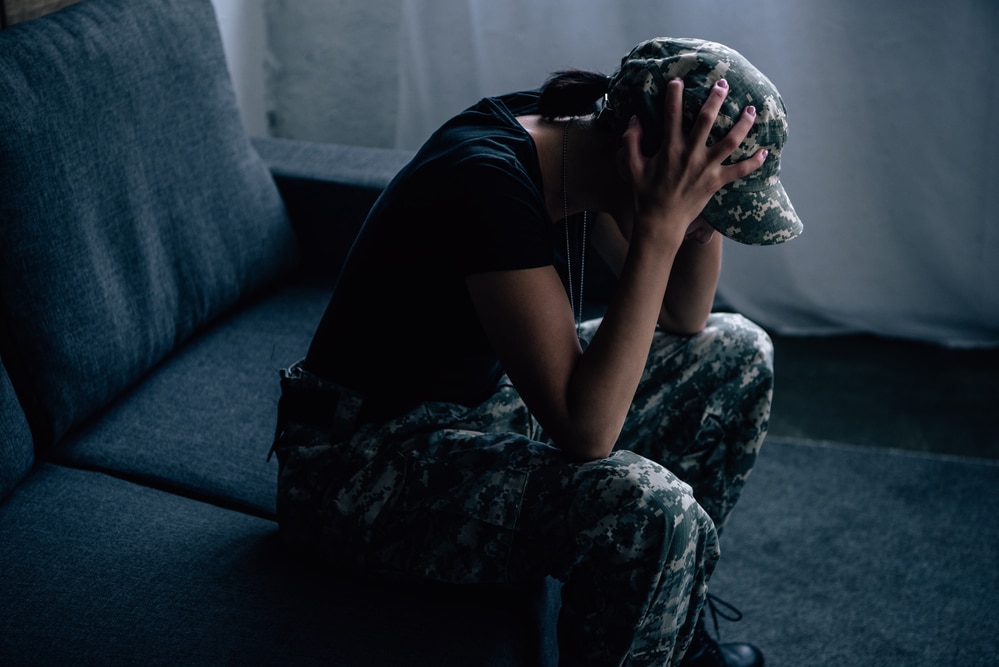There are currently more than 1.4 million active-duty service members in the U.S. military. In addition to those actively serving, an additional 19 million veterans live in America as of 2021.
Unfortunately, these brave men and women who serve our country are at high risk of developing mental health problems. Since 9/11, more than 30,000 active-duty service members and veterans have committed suicide.
Understanding the true nature of military mental health and what can be done about it is crucial to preventing suicide and a decreased quality of life for veterans after transitioning back into civilian life. Learn how the military affects mental health and how military personnel can receive the mental health services they need when they need them.
How Does the Military Affect Mental Health?
Active service members are exposed to numerous traumatic events and have a significant risk of being injured, especially during deployment to an active combat zone. Experiencing military combat means being in a high-stress situation for days, weeks or months at a time, which by itself has a negative effect on mental health. When you add in the potential for assault, witnessing death and experiencing natural or man-made disasters (often regularly), this compounds the issue.
A lesser-known mental health risk to service members is sexual assault. It’s estimated that nearly one in four female service members is sexually assaulted during their military career. While men who serve are also at risk, they suffer sexual assault at a significantly lower rate than their female counterparts.
A final risk to mental health is transitioning back into civilian life. Many service members find it challenging to return to their normal lives and family members after experiencing ongoing traumatic events. Injuries sustained during combat can make this transition even more challenging, which can further increase the risk of suicide.
If you or a loved one is having thoughts of suicide, you should contact one of two suicide prevention programs immediately. The Veterans Crisis Line is available 24/7 at 1-800-273-8255. You can also call the National Suicide Prevention Hotline by dialing 988.
If you’re experiencing a medical emergency, including strong suicidal thoughts, you should call 911 to have emergency medical personnel dispatched immediately to your location.
What Is the Most Common Mental Illness in the Military?
The most common mental health problem among military personnel is post-traumatic stress disorder, followed by depression. Traumatic brain injury (TBI) is another prevalent issue.

What Medical Conditions Get You Kicked Out of the Military?
Having a mental health issue doesn’t automatically disqualify you from the military. Instead, the severity of mental health conditions, the duration of treatment and how long it’s been since you received mental health services will all be taken into consideration.
Generally, any mental health conditions that require ongoing or inpatient treatments can be grounds for a medical discharge or forced retirement. However, speaking to your doctor about your concerns can’t get you kicked out of the military. Sometimes you’ll be placed on temporary leave to receive the treatment you need and then given the option of re-activating.
Each case is different, but regardless, you should seek treatment if it’s needed. It’s better to take a break or rejoin civilian life than risk a worsening of mental health concerns.
What Types of Mental Health Treatment Are Available for Military Mental Health Issues?
The type of mental health treatment options available for military personnel or veterans depends on several factors. What mental health condition you have, how severe it is and whether you have co-occurring conditions will all affect treatment.
However, a few examples of mental health care options that might help you or your loved one include:
Alcoholism treatment: This treatment is available to any military member who abuses alcohol, either alone or as a means to cope with their mental health conditions. One of the first steps of alcoholism treatment is often detox.
Detox program: Detox is a process that supports you or a loved one while all traces of alcohol or drugs leave their body. Withdrawal symptoms are often experienced during this process, and it’s easier (and safer) to undergo with medical care.
Dual diagnosis treatment: Dual diagnosis treatment is provided to any military members who battle an addiction and a mental health condition at the same time. Treating both simultaneously offers the greatest chances of recovery.
Drug addiction treatment: A military and VA drug rehab center usually uses a variety of therapies, this treatment helps service members overcome substance abuse.
Individual therapy: Individual therapy teaches healthy coping mechanisms and helps active-duty members or veterans work through their trauma. A mental health screening is usually done before starting individual therapy to help guide the ongoing sessions.
Family therapy: Family therapy can strengthen support systems by increasing the understanding of what service members are dealing with. It can also be therapeutic for everyone involved and help heal any problems within the family unit.
Group therapy: One of the most significant benefits of group therapy is understanding you aren’t alone. Sharing experiences can help ease the feelings of loneliness that often affect service members and their families.
If you’re battling post-traumatic stress disorder or another mental health condition with substance abuse problems, it’s important you reach out to get addiction treatment for veterans and military personnels. Getting help can reduce your suicide risk and significantly improve your overall quality of life moving forward.
Getting PTSD and Trauma-Related Treatment at Behavioral Health Centers
If you or a loved one is a veteran or active-duty service member battling mental health issues, Behavioral Health Centers is here to help. We are also a TRICARE-covered rehab facility, so you don’t need to worry about your coverage plan for addiction and mental health disorders treatment. Call us today at 772-774-3872 to speak with one of our mental health professionals at our Florida location. If you live in New Jersey, New York or Georgia, consider traveling to our rehab to receive treatment.
You can fill out our online contact form if preferred and someone will reach out as soon as possible.





